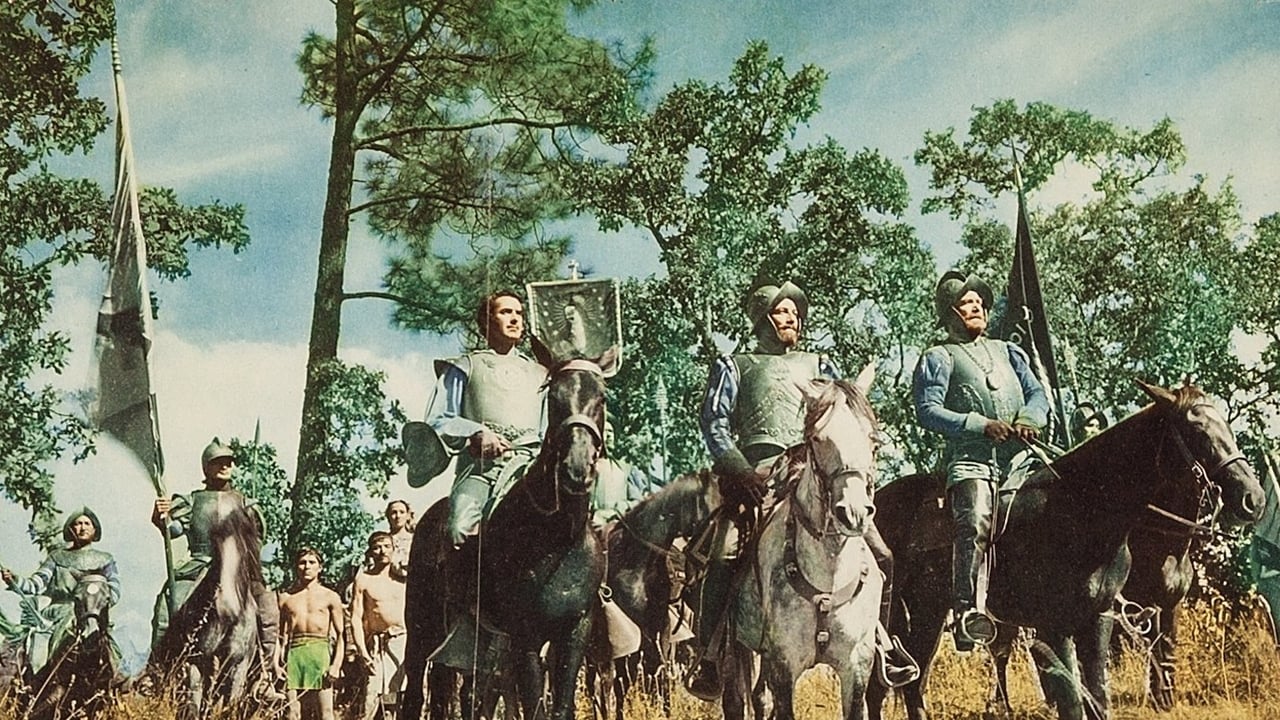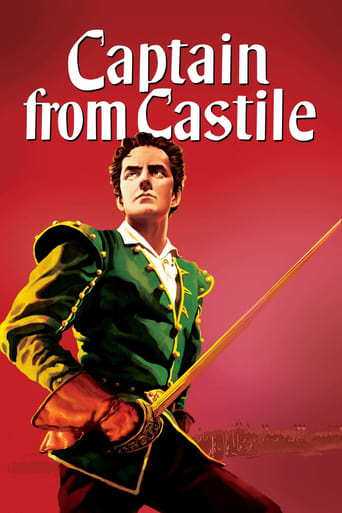



What makes it different from others?
It's the kind of movie you'll want to see a second time with someone who hasn't seen it yet, to remember what it was like to watch it for the first time.
View MoreI think this is a new genre that they're all sort of working their way through it and haven't got all the kinks worked out yet but it's a genre that works for me.
View MoreThis is one of the best movies I’ve seen in a very long time. You have to go and see this on the big screen.
View MoreThis film is a splendid specimen of the genre. An all-time favorite I can't see enough of, and, well, let's do give a thought to those Aztecs. Captain from Castile is a fine rendering of that class of fiction from the first half of the 20th Century described best as book club novels. Written to a literate and culturally attuned market, they combined dramatic history with compelling characters enmeshed in swashbuckling dilemmas. The novelists never wrote down to their readers and always kept a literary trick up their sleeve for the tight spots. Kenneth Roberts, F. Van Wyck Mason and Frank G. Slaughter were of that class, and Frank Shellabarger's Captain from Castile is a worthy exemplar of their craft. The storyline, to reiterate briefly, centers on the young Spanish nobleman, Don Pedro de Vargas (Tyrone Power), who offends an official of the Inquisition and is forced, as are his parents, to flee from its net. His parents escape to Italy, and he embarks to the new world for adventure as much as to recoup the family fortunes. Leading the way for him is a seasoned soldier of fortune played by Lee J. Cobb, and following de Vargas is the Spanish equivalent of a pretty barmaid played by Jean Peters. Landing in Spanish Cuba they sign on with Hernan Cortez's expedition to conquer and colonize Mexico. There is little need to expatiate on the plot details, which provide plenty of entertainment to embellish the historical account, and so far as both go the film is instructive and entertaining. (There was no need to draw on fantasy in cinema of that day.) What may trouble younger viewers is whether Captain from Castile treats native Aztecs, Olmecs, and like tribes with sufficient respect, given the certainty that their way of life was doomed by the Spanish invader. On whole, the film treats indigenous peoples with dignity and understanding, although some may quibble about that. Key to the film's overall ethnic take is the last rather triumphalist scene. As Cortez's steel clad legions march past the lightly armored native defenders, Jean Peters, now Don Pedro's wife, wraps a bright red native shawl around herself and her newborn to march behind the army, in appearance a nascent Mexicana, neither Spanish nor Indian - Mexican. In this sense, I found the film sympathetic and in its way inspiring, no matter how the more fastidious may differ about that. I have to add my approval for the scenery. With much of it set around the Aztec pyramids, it is dominated by a distant active volcano, which injects a unique quality and makes the film worth at least a second look just for that backdrop.
View MoreSpain in the spring of 1518 finds dashing nobleman Tyrone Power (as Pedro de Vargas) helping an acquaintance on horseback find a runaway servant. Locating the man, Mr. Power discovers he is slave friend Jay Silverheels (as Coatl), who shows his back has red welts from being whipped. Moreover, his wicked master John Sutton (as Diego de Silva) is in charge of the Spanish Inquisition. Power becomes "persona non grata" with Mr. Sutton, to put it mildly. What happens to Power's little sister is shocking for a mainstream film seen by general audiences, even though the deed occurs off-screen...Power's allies include pretty Jean Peters (as Catana Perez), enterprising Lee J. Cobb (as Juan Garcia) and colonizing Cesar Romero (as Hernan Cortes). The action eventually moves to Mexico. It's nice to see stereotyped thug Marc Lawrence (as Corio) doing a good deed. The film is lavishly presented in Technicolor by director Henry King with his cinematographers Charles G. Clarke and Arthur E. Arling. Alfred Newman's terrific musical score was nominated for an "Oscar" and Ms. Peters' busty debut received a "Newcomer" nomination in the annual "Film Daily" poll. However, the story is wearisome.****** Captain from Castile (12/25/47) Henry King ~ Tyrone Power, Jean Peters, Cesar Romero, Lee J. Cobb
View MoreI first saw this film as a child, around 1950, and was bitterly disappointed when it ended just at the point where it was getting interesting. Like most reviewers, I found that too much time was wasted on the melodrama and introduction of the characters, at the expense of the action. To end the film without the siege of Tenochtitlan and the battle along the causeway cheated the viewers who had sat through two hours of the build up. The whole reason for going to the New World was to escape Spain, and make their fortune, and in the case of Hernan Cortez, conquer the New World and get very, very powerful. As the film was made just after WWII and one would have expected a victorious war film set in 1518, but for whatever reason, they just cut the story short and created an anticlimax.The Technicolor was excellent and the locations added authenticity, but I was puzzled by all the native people with beards and mustaches. I had always thought that they lacked facial hair and the 26 years since the New World was first sighted was hardly enough to have resulted in a Mestizo population, especially as the first settlements were in the islands. We were told that the Mexicans worked closely with the filmmakers to ensure authenticity, so maybe they did have beards! I was almost prepared to see sombreros! The film at least addressed the conflicting motives for conquest, God and Gold! We also have to remember that Mexico was a long way from Spain, and Cortez was out for what spoils he could grab, the acceptable way to make one's fortune since time began. The fact that other peoples' possessions are not fair game to grab is a problem that we are only just beginning to recognize, and even today, pity the people who find themselves living on property standing atop an oil field or in the way of progress of one form or another.I would like to see Samuel Shellebarger's book remade in the form of a Mexican Telenovela where they have no problem with taking 100 hours to tell the story. Perhaps then we would also hear the events from the native perspective about how hard they fought, rather than the impression we are given that they surrounded at the first sight of the Conquistadores.
View MoreIf Captain from Castile is remembered much today it probably is because of one of the most rousing marches a Hollywood composer ever wrote. The "Conquest" theme is heard only three times, and the first two are brief but effective scene setters. We have to wait until the movie is almost over and Hernan Cortez is setting out on his march to the Aztec capital of Tenochititlan for the full treatment. The music, by Alfred Newman, embraces the moment, with hundreds of soldiers, the priests, the natives, the hangers-on spreading out before us, the horizon lightening and a single volcano smoking in the distance. The theme is inspiring, martial, emotional, uplifting and memorable. It's enough to make most movie goers want to sign up and most historians queasy. In less than a generation a civilization of between 2 million and 6 million people was obliterated, ground into quickly fading memories under the heels of soldiers, landowners and priests, with nearly all Aztec records burned, nearly all Aztec structures torn down, and nearly all natives, allies and enemies of the Spanish alike, turned into ignorant serfs under slave conditions that would make most American slave owners either blanche or be envious. But enough about reality, a foolish expectation when Hollywood deals with history. Captain from Castile is a Tyrone Power swashbuckler made under the shrewd eye of Darryl F. Zanuck. Considering that the book by Samuel Shellabarger was a huge best seller, well written and stuffed full of history, the movie seems to me to be almost as dull at times as a Spanish onion, especially during the first half hour. Here, in Spain, we learn about how noble is young Pedro de Varga (Power), how noble his father and mother are, how noble the serving wench Catana (Jean Peters) is, how noble Juan Garcia (Lee J. Cobb) is...and what a piece of self- serving vomit is the local head of the Inquisition, Diego de Silva (John Sutton). Once we're in the prison with Pedro, his family and Juan, where de Silva has put them for heresy, things pick up. After Pedro and Juan escape with Catana's help and when the three reach Cuba, things pick up even more. And after an hour, when we finally reach the coast of Mexico along with Cortez and his raggedy army of about 600 soldiers, the movie actually starts. Pedro may be fleeing the Inquisition, but now he has a chance to prove himself, to help Cortez conquer an empire, to realize his growing love for Catana even though he is of aristocratic birth and she is but a peasant, and finally to ride along side Cortez for the fateful meeting with Moctezuma II. His friend Juan is with him. His new wife Catana, carrying their baby son, is in the crowd, and he has his friend and confessor, the wise and understanding Father Bartolomeo (Thomas Gomez), to nag about human rights. Pedro has survived false accusations, sword thrusts and knife wounds. He has proved his worth to Cortez, has foiled plots and, finally, has been promoted in Cortez' army to captain. The captain from Castile is on his way to being a contented conquerer of the Aztecs. Two first-rate performances are worth mentioning. One is by Lee J. Cobb. After seeing Cobb so powerful in movies like Thieves' Highway, On the Waterfront and Twelve Angry Men, it's a jolt to see him in this earlier costume caper. Still, he manages to give a strong performance, in spite of the tights he has to wear. The other outstanding performance is by Cesar Romero as Cortez. Romero roars through the movie with charisma, high spirits and shrewdness. It's an expert job with no hamminess, and is one of the few performances in the movie that has energy. We pay attention whenever Romero shows up. Captain from Castile is a great example of a big Hollywood spectacle from the Forties, and I don't mean that as a criticism. On many levels it's fun to watch. At the same time, it seems to me to be a film which is too solemn for its own good. For those who enjoy a good historical read, Shellabarger's novel still has its merits. For an engrossing, exciting and often gruesome picaresque novel about the Aztecs just before, during and just after the Spanish conquest, try Gary Jenning's Aztec.
View More